Monday, March 20, 2006
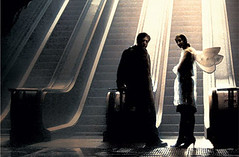
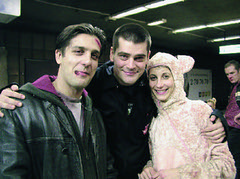
Title:Kontroll
Cast: Sándor Csányi, Zoltán Mucsi, Csaba Pindroch, Sándor Badár, Zsolt Nagy, Bence Mátyási, Gyözö Szabó, Eszter Balla, László Nádasi, Lajos Kovács
Director: Nimród Antal
Bulcsú lives underground. The idea of going above ground is not one he is comfortable with. At night he sleeps on the deserted platforms of Budapest's underground system. By day he works as a ticket inspector. A despised profession, and he is a member of the bottom wrung team. The extremes of which are the narcoleptic Muki, who falls asleep whenever he gets argumentative, and new boy Tibor who is being kept in the dark about some of the things that go, but then isn't the brightest member of the group anyway.
Following Bulcsú and co we go through a couple of days as a ticket inspector. The repeated abuse and conflict they suffer as they encounter every kind of nutter, and try to get a ticket out of them. From which we see patterns emerge - the rivalry between the groups of inspectors, the young punk Bootsie who sprays cream in the face of any inspector he meets, and the rising number of people who seem to be throwing themselves in front of trains. Two things happen to Bulcsú to knock him out of his increasingly isolated rut - he witnesses one of the deaths, and he meets an enigmatic young woman dressed as a teddy bear.
Why did the Budapest Underground allow this film to be filmed? That's the question the man responsible keeps being asked, but as he explains in the introduction to the film, he hopes that people can separate the fiction from reality. As far as he and the director are concerned Kontroll is a fairy tale, about good and evil, set in a kind of underworld, which the atmosphere of an underground system brings to life. Of course the fact that the film opens with this disclaimer suggests that someone along the line was concerned about the image people would have of Budapest after seeing the film.
Kontroll is a surreal Hungarian film that did the festival circuit and small art houses a few years ago. While it played a few places in Scotland, if it played locally to me then I missed it. Though I had read about it each time it played somewhere else and was interested in seeing it. Having slipped my mind, I stumbled across the DVD the other day and bought it straight away. Kontroll is a mixed film - comedic, romantic and sinister - all the makings of a glorious cult status.
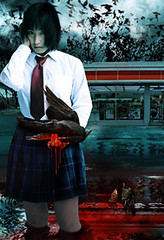
Title:Cursed [Chô' kowai hanashi A: yami no karasu]
Cast: Kyôko Akiba, Takaaki Iwao, Etsuyo Mitani, Hiroko Satô, Osamu Takahashi, Susumu Terajima
Director: Yoshihiro Hoshino
A large chain are preparing to take over a small convenience store, however the representative of the chain has met with a strange accident. So one of his colleagues has to finish the deal - going along meeting the owners and doing a stock take. But neither the stock or the owners, or the store for that matter, are what she expects. In fact the only thing that does seem to be normal about the place is the girl that works the till.
The obvious first frame of reference for this Japanese horror film would be Ju-on - The Grudge. Both being about locations, Ju-on featuring a haunted house where bad things happen, while Cursed features a haunted convenience store where bad things happen. But comparisons to Ju-on would be simplistic. The store in this film is the kind of place you would perhaps find in the town that featured in Uzumaki, staffed by relatives of the hoteliers from Gozu.
A store where no matter what you buy it always comes to either 666 or 999 yen. Where after shopping there you will be lured down dark alleys by the voice of children, or something threatening will follow you home. Where bird strikes against the shop front leave a pile of dead crows out front. Where the owners spend all their time sitting watching the checkout girl's every move via CCTV. Cursed is kind of bizarre, a little uncomfortably weird - where regular Asian horror builds to an explanation, Cursed just is, with a character turning up long enough to give token gesture explanation for those that need it, before getting back to the madness.
The original Japanese title for this film is actually Chô' kowai hanashi A: yami no karasu, so Cursed isn't a direct translation. I am reliably informed that a direct translation would provide something along the lines of "Totally Scary Story A: The Crow of Darkness." While you can understand why the distributor for this DVD didn't go with the unwieldy version, Cursed seems a bland substitute, and the original title does kind of sum up the film better. The Crow Of Darkness - more fun than the more formulaic Asian horror films of late.
Friday, March 17, 2006
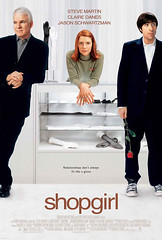
Title: Shopgirl
Cast: Steve Martin, Claire Danes, Jason Schwartzman, Bridgette Wilson, Sam Bottoms, Frances Conroy
Director: Anand Tucker
Mirabelle Buttersfield (Claire Danes) is a small town girl who has moved to LA as an aspiring artist. Though she makes ends meet by working in the sparsely patronised glove department of a major store. She feels a little isolated and stuck in a rut, so the approach of Jeremy (Jason Schwartzman) offers some hope. However as young and attractive as he, he has no money, or manners, and only really seems interested in sex. Before she can get too disappointed though she is approached by Ray Porter (Steve Martin). He is older, for sure, but he is rich and charming. Despite the fact that he is really only after sex as well he is much more charming, and Mirabelle allows herself to think that there is more to it than that.
Shop Girl is produced and written by Steve Martin, adapted from his novella – which I read several years ago. Martin’s work as an actor is hit and miss. Though I suspect that the ones that he had more input into and are more original are the ones where he is better. I particularly enjoyed films like LA Story, Grand Canyon and Leap Of Faith, which is how I came to read Shop Girl. Though I recall being disappointed when I read it. Perhaps because of the change of medium – the being used to him as an actor rather than writer? Perhaps because it was published as a novel and I expected a novel rather than a novella?
As a film the story comes to life - the three leads bring the characters to life. The mannerisms, reactions and the way the characters just interact with each other clicks into place on the screen – visual things that come over better than they might in the sparseness of a novella.
For the most part Shop Girl is a fairly quiet, downbeat film. Which is perhaps why it doesn’t seem t have had too much of a profile – barely being shown for a week, while lesser films just seem to go on and on. I rather enjoyed this film, it appealed to that vague romantic spark I have somewhere inside. Watching it makes me want to re-read the novella; if only I could remember which pile books I put it in.

Title: After Midnight [Dopo mezzanotte]
Cast: Giorgio Pasotti, Francesca Inaudi, Fabio Troiano, Francesca Picozza, Silvio Orlando, Pietro Eandi, Andrea Romero, Giampiero Perone, Maurizio Vaiana
Director: Davide Ferrario
As I write this I trace a pattern. The links and themes between the films I have seen in the last week. Hidden, about a family sent videotapes by a stalker, revealing stories of the past. Frozen, the last trace of a missing person being a CCTV tape, acting as catalyst to contemporary myth. And After Midnight, a film about film and about narrative.
This Italian film is narrated throughout, the voice explaining that in the past films were more about place than characters. With that the place at the heart of After Midnight being The Mole, which is the Turin Museum of Cinema. Martino is the Museum’s night janitor, who whiles away his shifts by watching old films – films about places. From watching so many silent films, spending so much time alone, Martino has become almost silent himself – imitating his hero Buster Keaton in his clumsy manner and dreaming of making his own film.
Every night Martino stops in at a fast food carryout across from the museum. This is where Amanda works – a short haired girl, who looks like she has had her nose broken at least once. Even so she has a definite appeal, and Martino is infatuated with her. She is the real reason he goes there every night, binning the greasy food as soon as he gets back inside the museum, but she is oblivious until she in trouble. The timing of which sees Martino opening the door to the museum, which she instantly darts through seeking refuge there.
But of course this isn’t as simple as boy meets girl. Amanda is the main, though not only, girlfriend of car their The Angel. Thus a love triangle rears its ugly head. In the process After Midnight mixes in a number of film clips and references while the characters run around the museum. Comparisons to Jules ET Jim are abundant, which After Midnight acknowledges when Martino makes a comment about having seen a French film that was similar to their situation.
With that After Midnight is not the most original film. In fact there are close comparisons to Bernardo Bertolucci’s The Dreamers, which probably came out about the same time as this Italian film did originally. Though the big difference is that After Midnight is worth watching and The Dreamers isn’t. Regardless of any comparisons, the performances here are engaging, and After Midnight is a pleasing watch – witty, warm and charming.

Title: Frozen
Cast: Shirley Henderson, Richard Armitage, George Costigan, Sean Harris, Natalie Henderson
Director: Juliet McKoen
Kath (Shirley Henderson) is a woman obsessed, her sister went missing one night, and she has been searching for her ever since. In the two years since she went missing Kath has become Frozen, exiting in a kind of limbo, with no trace and no explanation she can’t move on. Kath is in grief counselling with her local priest, but when she steals a videotape from the police of her sister’s last known movements, she becomes fixated on the hope that it provides her.
Frozen is an odd film. It mixes some striking visuals with a degree of magic realism. The video is of CCTV footage showing Kath’s sister, between one camera and the next the sister vanishes, each time Kath stands in front of the camera she steps into a vision. The idea of a CCTV camera that affects reality is something that one would perhaps expect to find in novels by Haurki Murakami or Russell Hoban. The visions themselves have a certain mythical reference – a blind folded boat man carrying people across a stretch of water to elysian fields – myth given contemporary feel.
Frozen’s big problem is just how seriously it takes itself. Some of the character interaction becomes melodramatic farce, the kind of thing British films often seem to fall into, without the slightest whiff of any hint of humour in the process. Showing in a mainstream cinema, with a reasonable turnout, there was a good number of people that walked out, while increasingly those that remained could not help but laugh at the increasing ridiculousness. Which is a pity, there are some particularly nice things about Frozen and despite its flaws it certainly has a potential.
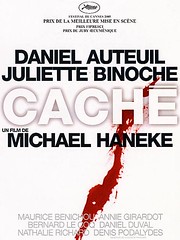
Title: Caché [Hidden]
Cast: Daniel Auteuil, Juliette Binoche, Maurice Bénichou, Annie Girardot
Director: Michael Haneke
A videocassette turning up on Georges and Anne’s door step starts the threatening process at work in the French film Cache (Hidden). Someone is watching them, and as more tapes and post cards arrive it becomes clear that this is something more than just a mad fan of Georges’s television show. Rather it would seem to be something to do with his past, an event he would prefer remained hidden from his wife.
Hidden is the latest film from Austrian director Michael Haneke. As always he is a difficult bastard. This is the fourth film I have seen by Haneke, other then the earliest all being filmed and funded by the French. The difficulty with Haneke comes from his tendency to be controversial, as well as just his whole approach to film making.
Funny Games was an in your face shocker, Code Unknown was dull, while Time of the Wolf was an interesting exploration of apocalypse. Hidden is probably most like Code Unknown out of those, how people clash against each other with undertones of racism.
The most interesting thing about Hidden is the use of videotape. The way that it integrates into the film, so that the viewer starts to question whether each scene is real of something that the characters are watching on tape. However, for the most part, Hidden is a slow film, where not much happens. Despite which it seems to have sparked wild speculation, many trying to fathom the motives behind events that occur here. Though most of the resulting ideas have little to back them up.
Cast wise we have Daniel Autiel and Juliette Binoche as the quintessential French couple. To a degree this is particularly safe casting, both reliable enough to give at least average performances, especially presented with such clichéd characters to work with.
Hidden is not the worst film I have seen by Haneke. But it certainly isn’t the best.
Sunday, March 12, 2006

Photo: Glasgow in the snow
Date: 12th March 2006, 2am

Photo: Shopping for second hand books
Date: 11th March 2006, 11am
Friday, March 10, 2006
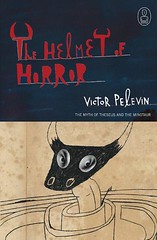
Title: The Helmet Of Horror: The Myth of Theseus and the Minotaur
Author: Victor Pelevin
Publisher: Canongate
You wake in a room. You have no memory of how you got there. The room has the feeling of a hotel. There are two doors. One is wooden, opening onto a bathroom. The other is metal, there is an axe symbol, it is locked. On the wall there is a screen, which shows the Internet, a thread on the Guardian Unlimited site, the only thread, a thread started by someone called Ariadne.
I shall construct a labyrinth in which I can lose myself, together with anyone who tries to find me - who said this and about what?
Thus starts The Helmet Of Horror, the fourth book in the Myth Series published by Canongate. Reinterpreting the myth of Theseus and the Minotaur. A group of people find themselves alone in a room, their only contact with anyone else through the message board. So the novel unfolds through the transcript of the resulting conversations. Ariadne relates her dream to the group, an encounter with the minotaur - a giant with a strange brass helmet, the helmet of horror - accompanied by two dwarves. From this the group decide that the legend of Theseus is relevant. But what is going on? Is one of the group Theseus, is Theseus going to rescue them? Is one of the group the Minotaur, is the Minotaur going to kill them? Are any of these people even real, how can they tell - when all they are to each other is text on a screen.
As the novel unfolds the Russian novelist Victor Pelevin explores ideas of reality and of manipulation. He provides each of his characters with their own personal maze, their own personal puzzle. On the one hand explaining the concepts of virtual reality and the ways in which the programmer can manipulate the user, while on the other using these very same techniques to manipulate the characters. With these manipulations the characters explore their mazes, literal mazes from reality reconfigured into fiction, and in the labyrinths they each encounter variations of the minotaur and his dwarves. All along they are supplied with information about the helmet of horror through Ariadne's dreams, a strange device which generates everything from the past, including itself.
As a novel this is a post-modern narrative, the kind where essentially a group of characters sit around and talk the entire time. Yet it nips along, the text structure of dialogue transcribed having parallels with a play, except here everything is told in the conversation, as we have no visual accompaniment or stage direction. Thematically the nature of the labyrinth, the Minotaur and Theseus are central - it is variously suggested that we all create and live through our own maze, that the Minotaur is the beast within us, Theseus the human, and so on. But at the same time, on top of that we explore the themes of love, religion, politics, reality and many more over the course of the novel. The development between the characters is one of the things that keeps the novel moving along - Ariadne dreams, relating information for Monstradamus and Nutscracker to work out, UGLI 666 insists that everyone is a sinner and needs to repent, Organizm (-; flirts with users as soon as he finds out they are female, while the relation between IsoldA and Romeo-y-Cohiba seem to form an intense attraction from the start. The characters flirt, fight and share, but the end unites them, as the truth is revealed. Though in terms of revelations, I suspect that I'll be needing to go back over it again before it entirely makes sense.
Title:Kabuki Alchemy
Author: David Mack
Publisher: Icon
Ok. I'm going to take pity on all you people that have never read David Mack's Kabuki. Here are two pages from the current issue of Kabuki-Alchemy. Don't say I never do anything for you!
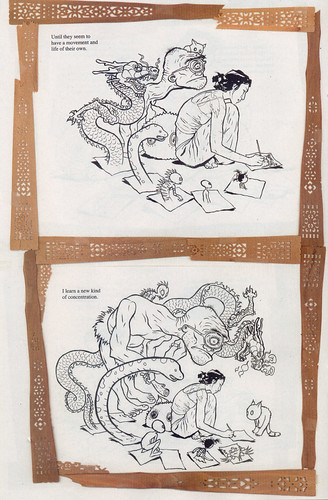
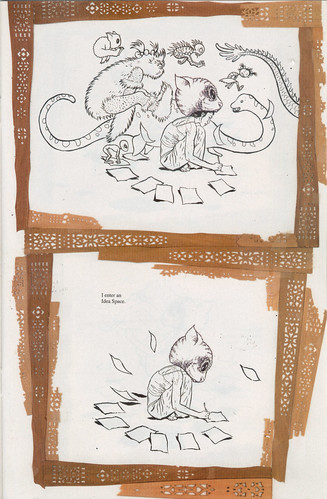
Click on the images for the BIGGER versions.
Thursday, March 09, 2006
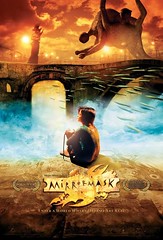
Title:Mirrormask
Cast: Stephanie Leonidas, Gina McKee, Rob Brydon
Director: Dave McKean
I caught Mirrormask as part of the Glasgow Film Festival, shown a week before it opened across the UK. Where it has been showing on general, if limited, release for the last week. Though next week's local cinema listings have it down to one mid-day showing a day, with the film no doubt likely to disappear the week after. Though as is so often the case now, the DVD is due for imminent release. Personally, especially with something as visually dense as Mirrormask, I prefer to catch films in the cinema where possible.
Mirrormask is the directorial debut of Dave McKean - the artist of all the Sandman comic covers, as well as numerous other books and CDs. He really developed and established a style that has become often imitated in the years since. Over those years, McKean has always worked with the writer Neil Gaiman - the author the Sandman comics, the Neverwhere TV series and novels like American Gods and Anansi Boys. Mirrormask is the latest collaboration between the two, the pair have written the piece, with Gaiman doing the final scripting/plot breakdown, and McKean bringing it artistically to life.
Mirrormask is a heavy mix of live action and animation, filled with wonderful creatures and odd encounters, all tinged with McKean's particular style. Overall Mirrormask feels like McKean's output more than Gaiman's - McKean being given a rare chance to really go overboard. With that Mirrormask is probably not the most commercial product when it comes to trying to sell a family/animated movie to a general audience - being a lot more weird and shifting than the run of the mill output.
Mirrormask is the story of Helena. A teenage girl, who typically doesn't get on with her parents and is full of teen angst. However, while some kids might dream of running away to join the circus, Helena's parents run a circus. The film starts with the latest fight between Helena and her mother, which ends with Helena telling her mother to die. Unfortunately before the night is through, Helena's mother has collapsed and is rushed to hospital. This brings Helena's world crashing down. From the colour and lights of the circus, she find herself in grey reality - living with her gran, while her father tries to keep the business from collapsing, and desperate for her mother to get better.
One night when Helena goes to sleep, she finds herself in another world. A world that reflects her drawings, a world that she knows on every level is a dream. But the dream, where the good queen has fallen ill and can only be saved by the Mirrormask, takes on a power that drives her. Perhaps if she can save the queen, who looks uncannily like her mother, then she can save her mother? Of course, things are complicated, no one knows what the mask is or where it is, the white queen has a dark counterpart, and that dark counterpart has a missing daughter who looks just like Helena and seems to be intent on destroying everything.
Mirrormask is obviously a metaphor. The dark and light queens reflecting Helena's conflicting emotions - the darkness of how she hasn't always gotten on with them, versus her regret at what she has said to her mother, and the real love the she feels for her family. Though only through the quest do we explore these emotions with Helena. Mirrormask is a dark fantasy and while at times the plot is overwhelmed by the imagery, if you immerse yourself in the whole then you can feel absorbed and overwhelmed by the moment.
Wednesday, March 08, 2006

Title:Kabuki Alchemy
Author: David Mack
Publisher: Icon
Kabuki was trained in the full range of martial art from an early age. When she was old enough she became an agent of the Noh Corporation - one of a group of characters who were allegedly made up for TV, but were actually enforcers and assassins. Working for the Noh, she found out that she had been betrayed. Realising the danger, the Noh Corp told the other agents that she had betrayed them. Injured Kabuki ended up under the protection of the Control Corp, and inter-corporate agency, protecting ex-agents.
While in the Control Corp hospital Kabuki receives a number of messages. A friend, called Akemi, plotting to help Kabuki break free. While at the same time the Noh plot to get and kill Kabuki. Akemi has transported Kabuki to America, where having been through the previous books Metamorphosis, Kabuki starts to undergo the process of Alchemy. The transformation of a leaden assassin to a golden girl.
Currently at its sixth issue, Kabuki: Alchemy is being published by Marvel's Icon imprint. Moving the series from Image Comics, who in turn had poached the original series from Calibre all those years ago. With Alchemy it seems that the Kabuki character has finally become more human. Part of this is the humour, the irony that writer /artist David Mack has brought to this story. What does an ex-agent of the Noh do for work in a new country? Why of course, she gets a job in Noh Land, a Noh Corporation theme park. But she has to start from the bottom, Kabuki is not allowed to play the part of Kabuki, rather she has the part of a cuddly cat called Kappa. Instead of being upset at not being able to play herself, she embraces the cat, starts referring to herself as Kappa in her letters to Akemi.
Kabuki is an evolving narrative. The art changing from black and white pencil work of the earliest material, to vivid, flowing montages. At the same time the story at this point seems to be constructed from letters, which as a comic could become incredibly dry, but not in Mack's hands. Kabuki crouched at home, balancing the cat head on her own, while writing the letters of her new life are wonderful images. At the same time, Mack keeps the big picture moving along - Kabuki has never been as simple as a quick summary might make it sound - with this most recent issue we have the arrival of MC Square, another guest of the Control Corp, and the raising of the question, who is Akemi really? And what is she doing with all the things that Kabuki and Square send her?
Undoubtedly Kabuki remains one of the most innovative, exciting and engaging works of contemporary graphic narrative.

Title:Battle In Heaven [Batalla en el Cielo]
Cast: Marcos Hernández, Anapola Mushkadiz, Bertha Ruiz
Director: Carlos Reygadas
Marcos is the General's handyman/driver. His duties amount to overseeing the raising and lowering of the flag every day, and driving the General's spoilt daughter about. Marcos has driven Ana about since she was a little girl, picking her from school, taking her shopping. Now Ana is a young woman, and Marcos is the only person close to the General, who knows that the General's tattooed, piereced, dready daughter is working in an exclusive brothel for extra money and the experience.
Battle In Heaven is a Mexican film that follows the contrasts between rich and poor, young and old, the lifestyle differences between Marcos and Ana. Ana swans about as she likes, while Marcos and his wife have done something terrible, something desperate to get some money. Marcos and his wife have been together a long time, and they still love each other, even if they have both become fat and ugly. But at the same time, Marcos is attracted to Ana, and as such confesses his crime to her. This is a complication, especially when Marcos tells his wife, who believes that Ana can't be trusted, and that something must be done.
Some will wax lyrical about the depth of Battle In Heaven, about the love triangle and its power. But to a degree, it is possible to read too much into the film. An aging man is tempted by a young woman, takes advantage of her when she offers him the chance, says something he shouldn't and has to deal with the consequences. The film has a particularly detached style, which again has lead to some intellectual discussion. But what it really means is that you never really get into the characters. At key points in the film, the director decides not to focus on the grit of the plot, instead he goes off for a wander, taking his camera to see what he can see.
The poster for Battle In Heaven urges caution, warning that this film contains scenes of real sex. To a degree that makes the film controversial, any hint of anything approaching real sex being enough for that. Though the reality of the sex is something I wasn't entirely convinced by - I suspect the use of a plastic phallus along the same lines as In The Cut or Festival. Regardless it sort of becomes a false controversy in real terms - its been done before, and certainly some people will be shocked, but those are the people who will be shocked every time, no matter what the film in question is. In fact the scenes most likely to shock the comfortable viewer are those with two naked fat people, where you don't actually see anything explicit.
Over all Battle In Heaven is an odd film. It is gritty, and not especially pleasant or comfortable viewing. The details of the poor family and religious events which work from the background to the fore being where the film has some strength. Though of the films to have broken out from Mexico in the last year, it certainly isn't the best of the bunch.
Tuesday, March 07, 2006
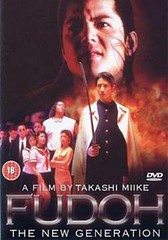
Title: Fudoh: A New Generation
Cast: Shosuke Tanihara, Kenji Takano, Marie Jinno, Tamaki Kenmochi, Tôru Minegishi, Miho Nomoto, Riki Takeuchi
Director: Takashi Miike
Fudoh is a senior Yakuza. When the older of his two sons steps out of line, pushing the city to the brink of a gang war, he decides that he must sacrifice his son to prevent violence. Ten years later the leaders of that particular gang are being picked off one at a time. The killings by a new generation of Yakuza - pre-teen killers and schoolgirl assassins. It isn't long before Fudoh realises that these attacks are being orchestrated by his other son, who witnessed his father murder his brother and swore revenge all those years ago.
To a degree this is a reasonably straightforward Yakuza film - tattooed gangsters killing each other for power or honour. But this is also a Miike Takashi film, and while he has done a number of regular Yakuza films, Fudoh has more of that controversial, taboo breaking edge that has made Miike such a notorious director around the world. Fudoh is one of his earlier films, so it is not as violent or shocking as some of his work, though it shows the direction he was moving in at that time.
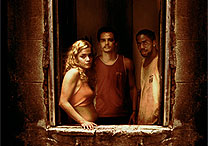
Title: Lower City
Cast: Alice Braga, Lázaro Ramos, Wagner Moura
Director: Sérgio Machado
Prostitute Karinna has decided to go to the city to make more money. Looking for a lift she is picked up my Deco and Naldinho. In exchange for sex the pair give her a lift on their boat. In the process though they all fall for each other a little. Triggering the love triangle that will slowly tear the three apart.
Lower City is a Brazilian film, which to a degree combines elements of successful Mexican films like Y Tu Mama Tambien and Amores Peros without really have the spark that made these films so successful. The back drop is gritty, combining cock fighting, strip bars and petty crime, weaving the 3 leads through this as they start to realise that they have a problem with what is going on. Despite the grittiness though, the plot is pretty straight forward, and while the film is watchable enough, it does lack any kind of real depth or originality.
Title: Doom
Cast: Karl Urban, Rosamund Pike, Deobia Oparei, Ben Daniels, Razaaq Adoti, Richard Brake, Al Weaver, Dexter Fletcher, The Rock
Director: Andrzej Bartkowiak
When a gateway is found it leads to instantaneous transportation from Earth to Mars. A team of scientists have discovered a pre-human civilization. However something has gone wrong, and an incident has occurred. Special forces troops are sent through the gateway to contain the situation and retrieve what data they can.
The film Doom is of course based on the computer game. The attempt to simulate the game on film using player POV being just one of the reasons why the film is awful. The bad acting, bad plot, bad soundtrack and bad effects are several more. Perhaps most disappointing is the soundtrack, which is actually done by Clint Mansell, who did such memorable work for Pi and Requiem For A Dream.
While the basic plot idea may be an SF classic, the story deteriorates into a basic shoot 'em up. Something that has been done better in any number of zombie films, or even fellow game adaptation Resident Evil.
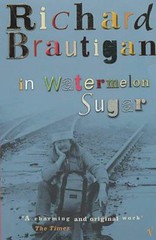
Title: In Watermelon Sugar
Author: Richard Brautigan
Publisher: Vintage
The narrator of In Watermelon Sugar doesn't have a constant name; it changes from person to person what he is called. This is just one aspect of what makes him a little more hermetic than the rest of the residents of Watermelon Sugar, and the town of iDeath. A place that is kind of a paradise, where the sun shines a different colour every day, everything is made from the watermelons and the watermelon sugar. Everybody makes sculptures, and there is a good community spirit in iDeath. Yet the narrator doesn't entirely fit in, so he has decided to write a book, about life In Watermelon Sugar.
This is that book, a series of encounters - how is relationship is going, how he gets on with his friends, the problems he has with his ex-girlfriend. With the ex-girlfriend we find that actually everything isn't ideal. This leads us to a suggestion that perhaps this is a post-apocalyptic world, the past is heaped up in the Forgotten Works. A place where the more contrary members of the community had made their home.
Like most of Brautigan's work In Watermelon sugar is a slight book, less than 200 pages. Playing around with structure, so that there are chapters that are little more than a paragraph long. Something which contributes to the dreamy unreality of his work, enhancing the odd ideas that one encounters here, the fractions of reality, the little things that build up to make his stories seductive. Though again part of the appeal is the melancholy, that balances and contrasts the whimsy. There is a darkness, that for all the colour and character of In Watermelon Sugar gets under the skin in the end.
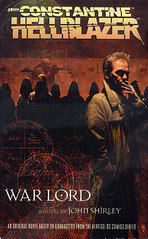
Title: John Constantine-Hellblazer: War Lord
Author: John Shirley
Publisher: Pocket Books
John Constantine has been living in an Iranian monastery, studying with the Blue Sheikh - who is rumoured to be over 400 years old and a magi of unrivalled ability. But even before the sheikh is murdered Constantine has outstayed his welcome. The maybe magician, maybe con-man has been approached by the "peace corpse", a group of restless spirits who are looking to do some good in the world before they move on. They want to recruit him, get him to prevent a world war, stop the summoning of a war god, and the murder of the sheikh is tied in somehow.
War Lord is the second John Constantine/Hellblazer novel by John Shirley. Despite a current run of media-tie-ins, John Shirley is an established and credible author. Having written both science fiction and horror novels over the years - being particularly influential in the cyberpunk scene. My copies of his novels City Come A Walking and Exploded Heart have introductions by William Gibson and Bruce Sterling. Regardless he is just one of a growing number of established authors who are taking on this kind of work.
Having read 4 novels by Shirley in the past I had a suspicion that he was actually the perfect choice for writing John Constantine novels. His first novel with the character was the film adaptation, something which made a clear departure from the comic book source material. Even with those departures, I had been kind of curious as to how a Shirley Constantine novel would read. Though I remained a little restrained, since film novels can often be a dubious endeavour. So when War Lord appeared as a second Hellblazer novel, I decided it was perhaps a better first step to take in that direction.
With War Lord Shirley makes some conscious references. He talks of alternate realities, which allows him to pass comment about this being the John Constantine of the comic, while there is the film version in another dimension. He also makes passing reference to a character called Jamie Ellis, which I would assume is an observation of those writers who have gone before him - Jamie Delano and Warren Ellis having done some of the most prominent Hellblazer material. In turn he also manages to work in a reference to Rudy Rucker, one of Shirley's peers from the early days of cyberpunk.
As a novel War Lord captures the tone of the comics well, with enough references across the history of the character to put Shirley's Constantine into context. Of course most comic series exist with a number of creative teams handling them, so the little shifts in character voice you get from a different writer are something that you get used to. The references to the lung cancer of the past and the recent Red Sepulchre graphic novel serve to smooth those out. The Red Sepulchre reference puts this novel into a recent point in the John Constantine story. While the war in Iraq, and the references to the possible flair up of war with Iran make it very much contemporary, even with that occult mysticism that comes with the territory.

Title: The Power And The Glory
Author: Graham Greene
Publisher: Vintage
Set in post World War One Mexico, The Power And The Glory is set against a background of Anti-Catholicism. While a priest in Mexico City itself would be ok, those further out are being arrested, and if they don't renounce their religion they are shot. There are only two priests left, one has renounced his religion and married his housekeeper, though he still lives in fear. The other is a whisky priest, an ambitious priest; he was an illustration of exactly what the backlash was against. But he has gone on the run, and has gradually been worn down, turning to alcohol to get him through. Being driven from town to town isn't enough though, the police are determined to put him out of business once for all, and a dogged lieutenant is on his trail.
The Power And The Glory is one of Graham Greene's most acclaimed novels, though judging by the introduction it was originally published in quite a small print run. Strangely, despite being known as a quintessentially English novelist, part of the appeal of him for me is actually the exotic nature of his work. The man in Havana, the train to Istanbul, the steamer to Paraguay, the trek across Mexico. Here he provides a snapshot of a period in Mexican history, based on he saw in the country on his own trips there at the time the novel is set. The novel, especially in the first part, is less concerned about lead characters or plot, instead fleshing out an environment, an atmosphere. Gradually coalescing into the story of the whisky priest and the police officer that is in pursuit. Allowing us to wallow in their obsessions, showing both sides as representing potentially harsh forces, but also showing each character with a certain sympathy.
Title:Boy Eats Girl
Cast: Samantha Mumba, David Leon, Laurence Kinlan, Tadhg Murphy, Sara James, Mark Huberman, Paul Reid
Director: Stephen Bradley
The Irish zombie film Boy Eats Girl finished the FrightNight showcase at the Glasgow Film Festival, bringing us towards the 12 hours of film mark. Talking to the organisers between films, it seems that Boy Eats Girl has actually been quite controversial, though I hadn't heard of it prior to this festival. There are a couple of references to suicide early on the film, and when there were a couple of suicides shortly after the Irish release of the film it was suggested the film was to blame. There was some move to have the film banned, which nearly succeeded, though the prevention may have come too late.
Nathan (David Leon) and Jessica (former pop-star Samantha Mumba) have been friends for years, but Nathan wants to be more than friends. Under pressure from his other friends, Nathan is finally going to try asking Jessica out, try and tell her how he feels. However, events conspire against them, and while Jessica is in fact interested, Nathan manages to be left with the impression that she has betrayed him and gone off with someone else. He goes home, drinks heavily, then hangs himself.
Of course, the fact that his mother is working on the refurbishment of the local church when she stumbles across a collection of voodoo paraphenalia means that isn't the end of the story. With, in theory, the best of intentions, Nathan's mother brings him back to life. But something goes wrong, and Nathan starts getting cravings, which it doesn't take long for him to pass along.
Boy Eats Girl in a post Shaun Of The Dead genre has a lot of potential, though one can only assume it was down with a lower budget than Shaun. The film on the whole is a little on the light side, skimping on plot or character depth. Instead it concentrates on propelling itself towards its gruesome climax. The zombie massacre that the film builds towards, coupled with the tongue in cheek approach it retains throughout, are what really make Boy Eats Girl a memorable film, and likely the most enjoyable of the day.
Title:Wild Country
Cast: Peter Capaldi, Martin Compston, Nicola Muldoon, Jamie Quinn, Kevin Quinn, Samantha Shields
Director: Craig Strachan
Wild Country was the focus of the Glasgow Film Festival's FrightNight showcase, the Scottish premier of a Scottish film. The red carpet having been dragged out while we watched Reeker, for the arrival of cast and crew, all lounging about in their suits and evening dresses, drinking free wine. This changed the entire mood of the day, the film fans being replaced by assorted star wannabes and hangers on. The film's producer sat in the row in front of us, her hairdresser in the row behind. Introductions were made before the film, and there was a brief Q&A after the film. The Wild Country team were also responsible for the shorts that were shown through the day - winners of a competition the production company had set up.
Kelly Ann, a school girl single mother, is upset when she has to put her child up for adoption. But with the pressure of the local priest, her mother, and having been abandoned by the father, it seems she has little choice. Shortly after the birth of the baby Kelly Ann joins a small group of friends on a church organised wild country trek. However as dark falls and they settle down for the night, Kelly Ann swears that she hears a baby crying. The sound is traced to a ruined castle, where they find a baby in amongst the trappings of some animals home. However, by rescuing the baby they have attracted the attention of the best - some kind of monstrous wolf, that is determined to kill them all. Unless they can kill it first.
Despite the pomp of the premiere, Wild Country is essentially a fairly straight forward and basic werewolf film. There are one or two scenes of outstanding grusomeness, but other than that there is little sense of real tension. The monsters have a curious fuzzyness to them, reminding of some kind of knock off Henson product, rather than some nightmare wolf figure.
Watching the film with the cast and crew was a little off putting, and not the way I would necesarily have liked to have seen the film. There is a certain backslapping, laughing at in-jokes response that comes from a showing like this, which doesn't allow for the film to be taken entirely on its own merits. On the whole the film is average, though there is one thing that does make it a peculiarity and provides some potential, and that is just how Scottish it is. The accents and attitude make Wild Country something you don't see every day, even if the same can't be said for the plot or the performance.
Title:Reeker
Cast: Devon Gummersall, Tina Payne, Derek Richardson, Tina Illman, Scott Whyte, Arielle Kebbel, Michael Ironside
Director: Dave Payne
"I spy with my little eye something beginning with F"
"F? I give up."
"Dad's fart!"
More or less that is the dialogue that opens this American horror film Reeker, the third of five shown in the FrightNight series at the Glasgow Film Festival. After starting with a fart joke, and calling the film Reeker, and then having a horrifying incident where a family appear to be brutalized by a bad smell, the end notes have the cheek to suggest that people avoid saying that this film stinks. Well, I guess after the film already belaboured the point it would be the height of lazyness, though when has that ever stopped anyone?
After the stereotypical opening scene of the horror film where something bad happens to disposable characters just to establish that bad things will happen, we gather a group of students who are car sharing as they travel into the desert to go to the biggest rave of the year. Half way there, the group stop at a motel, the place has been abandoned in a Mary Celeste fashion. The group find this to be creepy, but with the lack of petrol, and half heard radio reports suggesting that thier has been some kind of toxic incident they are offered little choice. As one would expect the group are picked off one by one, a bad smell accompanying each death. There is an undertone of something truly sinister going on here, flashes of figures, blood stained motel rooms, all building towards revelation.
The Reeker comes out as this flitting, sinister figure. The thing behind the smell. At the climax we are offered a twist, some attempt to make this more than run of the mill. Unfortunately, that twist is pretty much an ending I have seen to some degree in at least 4 other films (the listing of which would of course be a give away). For the most part this is a gorey low budget horror film, delighting in its tackyness. The real reason we watch something like Reeker though is that it knows what it is, and incoporates a definite humour into the process. The humour being what makes it worth watching, with a UK release pencilled in for the summer of this year.
Title:Bunshinsaba
Cast: Gyu-ri Kim, Se-eun Lee, Yu-ri Lee, Seong-min Choi, Jeong-yun Choi, Yu-jin Lim
Director: Byeong-ki Ahn
The all day FrightNight festival at the Glasgow Film Festival continued with another Korean film, though originally it should have been the only Korean film of the day if the planned Japanese film had turned up. While Bunhongsin reminds of the Phone, the director of the Phone offers us Bunshinsaba, which reminds of Whispering Corridors.
Yoo Jin has moved from Seoul to small town Korea, and is being bullied by the xenophobic local school girls. Joined by a couple of the other girls at school who are recieving similar treatment, they use the ritual of Bunshinsaba. Which summons the spirits of the dead, a ritual similar to the use of the Ouija Board, which is the title the film has been given in English. The spirit they summon is of another school girl, one who died 30 years before. The first girl to die is found in the seat that previous girl sat in, and thus it starts. There were 4 names on the list that the spirit was set upon, and they are picked off, one by one. But once those 4 are dead, will the spirit of vengeance be satisfied?
Bunshinsaba has parallels with 1999's Whispering Corridors, since both are Korean films set in girl's school. Both feature the return of a girl who died in the past, and the arrival on a new teacher. There are also similar scenes of scary going ons in dark school corridors. However, the film opens up past that initial plot, the dead girl from 30-years prior came from more than just school girl excesses, rather this was a village wide campaign. The girl from the past and her mother were rumoured to have some kind of psychic powers, a fact that brought suspicion upon them. The fact that the village was isolated and was hostile to strangers made that tension more intense.
Again, like many of these films Bunshinsaba has a variety of elements that we have seen before. Ideas of reincarnation, posession used to express hostile school systems and mistrust of strangers. There are a couple of scenes that particularly give Bunshinsaba its own identity, which is always a good thing, enabling it to avoid entirely disappearing in a sea of Asian horror.
Title:Bunhongsin
Cast: Hye-su Kim, Seong-su Kim, Yeon-ah Park, Su-hee Go, Eol Lee
Director: Yong-gyun Kim
Bunhongsin is a Korean film, which I am informed has been doing big business in South Korea recently. Though given some of the biggest banking films I have seen from Korea, that doesn't necesarily provide a good guide. Given the English title of The Red Shoes, Bunhongsin presumably has some basis on the fairy tale by Hans Christian Anderson, he is credited on the IMDB page if nothing else. As yet, Bunhongsin is not being shown widely outside Asia, this early showing being a last minute substition in FrightNight's collaboration with The Glasgow Film Festival - the original Great Yohai War by Miike Takashi having been detained at another festival.
Sun-jae (Hye-su Kim) is an accomplished eye-doctor, on the brink of opening her own clinic. Even so, her husband treats her like dirt, having nothing but criticism for her. The fact that thier daughter, Tae-su (Yeon-ah Park) is clearly favoured by the father and is entirely spoilt exacerbates the situation. So when Sun-jae comes home to find her husband in bed with another woman it is the last straw. She drags her daughter away from the family home, and the pair set up in a dingy little flat.
This stage has a clear Dark Water vibe going on, the mother and daughter, the dingy flat, the ideas of relationships. Though Sun-jae is not your usual vulnerable downtrodden wife, she is obssessed with shoes. So it isn't long before she has her glass display cases set up, taking up half the flat, and showing her shoes off for all they are worth. This is where the complication comes in, when one day on the underground Sun-jae comes across a pair of shoes. An exquisite pair of pink high heels, just sitting there. Too good to be true, obviously, since these shoes are cursed. Which of course nudges us into The Ring/Phone territory, though instead of a video tape or mobile phone we have a pair of shoes.
Like many Asian horror films Bunhongsin is about parenthood and the relationship between mother and daughter. Here though, while the horror aspects are pretty much run of the mill, the actual relationship has a little more dynamite to it than what we usually encounter. The daddy's girl relationship, the spoilt little girl dynamic, excercises a real power here. Building up a fury and violence of emotion between the pair, especially when you add the force of the red shoes to the equation.
For the most part Bunhongsin progresses as all of these films do. Set up an object, set up a dead girl, set up a haunting, set up revenge. As such Bunhongsin isn't really anything remarkable, though it is watchable enough. However, in the end Bunhongsin goes all Switchblade Romance on us, just as things are about to wrap up and you think you know what is happening, everything goes barmy and you are left thinking, what the hell was that all about?
Title:Islands In The Net
Author: Bruce Sterling
Publisher: Legend
Laura and David Webster have built a concretized sand lodge, an outpost of the Rhizome Corporation that they belong to. Rhizome is a new kind of corporation, an economic democracy. Technically they have taken some time out to raise a family and run this small outpost. But Laura keeps in touch with her connections and is ambitious to climb up the company's hierarchy. It is through these connections that she gets the head's up, her lodge has been selected as the location for key negotiations. Gathering three groups of data pirates together, representatives of edgy cultures, where technically illegal activitities have been given the backing of small island nations and bought governments. However early in the meeting one of the Grenadine representatives is murdered and Rhizome are exposed as having dealings with pirates.
This is the set up for the immersion of Laura in a culture foreign to her. Where corporations and pirates have more global, cross-border influence than world governments or forces. The novel shifts from America to Grenada to Singapore to Africa. Exploring technologies and cultures, the shifts that Sterling extrapolates from the point of writing in the late 1980's. Of course having been written something like 18 years ago, Islands In The Net is dated to some degree. Perhaps feeling more so than novels that are even older, because we are closer to the point of origin. Novels from the 1960's can sometimes feel weird and wonderful from a point 40 years on. But at a point where the net was just emerging it would be hard to predict how things have indeed ended up. So comments about fax machines, tele-conferencing and it being cheaper to send video at night rates all seem a little curious, a little off.
But to a degree, the technologies aren't entirely the point of Islands In The Net. Reading the first pages of the book, I find that I see parallels between Sterling and Kim Stanley Robinson that I wasn't conscious of before. Though on reflection, the kind of eco themes that Robinson is known for have always been present in Sterling's work as well - here the novel starts with a post hurricane beach scene and makes a variety of references to food and resource shortages, while Distraction had an undercurrent reference to rising sea levels and Heavy Weather dealt with the threat of storms. Wars over oil and cataclysmic storms and organisations with more power than governments are all realities, so the fact that Sterling and the like were writing about these things so far back is interesting and telling. How have things changed, how did people then see things changing? Its always a risk with science fiction, setting a novel in the near future, how quickly are you going to be proved wrong? But sometimes its a risk that has to be taken, particularly for some of the most relevant material.
Curiously one of Sterling's most recent novels was Zeitgeist, which was had a distinct magic realism to it, much more contemporary and weird than anything else that he had written. Yet there are undercurrents of magic realism in here, muddled up with the strange cyberpunk standard of voodoo. It never really comes to anything, but throughout Islands In The Net there are references to the optimum personality - part voodoo trick, part astral projection, part just weird in a world of date pirates and economic democracies.
Overall Islands In The Net is far from perfect, undoubtedly not Sterling's best work. The dated technology, some character weaknesses, a certain fuzziness/long windedness to the plot, all detract. But it is still readable and enjoyable, fitting well into Sterling's back catalogue, though it seems to be out of print (at least in the UK) and I ended up picking up this edition second hand. [Unfortunately I can only find the ugly American cover, scan of not as ugly UK cover to follow.]
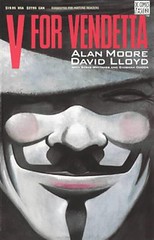
Title: V For Vendetta
Author: Alan Moore
Artist: David Lloyd
Publisher: Vertigo
The Tory government that came to power in the late 1970's lost the election in the early 1980's to be replaced by Labour. Labour removed all nuclear weapons from Britain. Shortly after that, war broke out, and Britain was nuked. Fortunately in terms of mass destruction it was a minor strike, but it was enough to send the country into turmoil. With corporate support, a new fascist party arose, and swept to power. Concentration camps and martial law were the order of the day.
Evey Hammond is a 16-year old girl who has been raised in the workhouses, having lost her parents in the war. The pittance paid to the workforce isn't enough to make ends meet, so Evey feels that the only way she can make ends meet is to sell her body like some of the other girls. Unfortunately, the first man she approaches turns out to be a government agent. An agent who will not think twice about raping and killing her.
It’s the fifth of November, the anniversary of the failed bombing of the British Parliament by the plotter Guy Fawkes. Just as Evey is being set upon a man dressed as Fawkes appears, killing the agents, and taking Evey to witness a successful bombing of Parliament. Thus starts the vendetta by a man only known as V.
V For Vendetta follows the expanding plot against the government by Codename V. We watch as those in charge desperately try to anticipate and understand his attacks. Carefully uncovering the truth, establishing that this is more than just an attack on tyranny. This vendetta is personal.
V For Vendetta was originally published in a serialised form. A collaboration in progress by Alan Moore and David Lloyd put together especially for the British anthology Warrior. However having only managed to print so many parts of the serial, Warrior collapsed with so much more of the Vendetta to go. With Alan Moore's success in bringing DC's Swamp Thing back to live as well as his post-superhero work The Watchmen, Moore had achieved a definite reputation. This allowed DC/Vertigo to complete the serialisation and then provide the eventual collection of V For Vendetta. Always having had mixed feelings about Lloyd's art, particularly with the colour process that was applied to the final version, I had put off reading Vendetta - even when I had had the original Warrior issues on loan.
But Alan Moore is a reliable talent. So with the persistently readable recent works like Top 10, Tom Strong, Promethea and The Extraordinary League Of Gentlemen, I felt it was an idea to fill in some of those gaps in the Moore catalogue. Especially with a film version of V for Vendetta about to hit the cinemas, following on from adaptations like From Hell and the Extraordinary League Of Gentlemen. Of course V For Vendetta does not disappoint, it is dark, dense and clever. Even the problems I had with the art/colour disappear as I immersed myself in the work. Of course how this will translate into a film remains to be seen, but then even where we will go and see a film based on Alan Moore's work we won't have high hopes. None of the film adaptations to date have been truly as brilliant as Moore's and collaborator's original works.

Title: Ocean
Author: Warren Ellis
Artist: Chris Sprouse and Karl Story
Publisher: Wildstorm
Nathan Kane is a UN Weapons Inspector, his latest is assignment though is something a bit different. On his way to Jupiter's moon Deimos he has a stop off on the Martian port, where he is set upon by a group of men determined to stop him completing his journey. When he arrives on an exploratory space platform in orbit above Deimos he starts to understand why this is such an important mission, why a weapons inspector would be sent to such a remote location. The platform has discovered alien relics in the oceans beneath the ice surface - alien warriors buried with their weapons. All of which is complicated by a DOORS installation that is also floating above the planet. DOORS being a powerful and pervasive corporation, that uses group mind/brainwashing on its employees to ensure loyalty. The kind of company who would quite happily exploit alien weapons technology.
Ocean was a 6 part series, now gathered in a book edition, written by Warren Ellis and illustrated by Chris Sprouse and Karl Story. Of course regardless of art team, this is an Ellis project, Warren being one of the most productive writers in the American comic's industry. Prior to this Ellis had done a handful of 3 part stories, material which had a 50:50 success rate as far as I was concerned. Ocean however is definitely a success, the extra page count allowing Ellis the space to expand out into, the space to do what he does best. Ocean is classic science fiction, the basis of a contemporary thought - weapons inspectors, particularly against the background of Iraq - extrapolated forward into space with the potential of aliens. Which always allows for a certain comment on contemporary events, while also providing some fun with ideas without getting bogged down in the actual events that inspired the work.
For me Ocean is one of the best short works from Warren Ellis in recent years.
 this is the voice of re:mote induction.
this is the voice of re:mote induction.